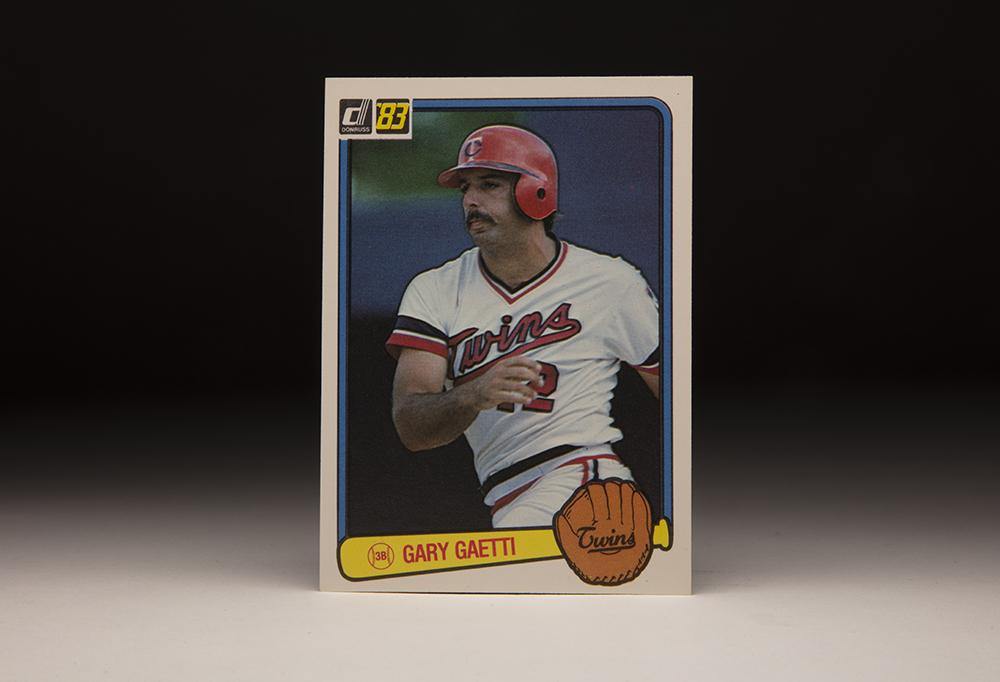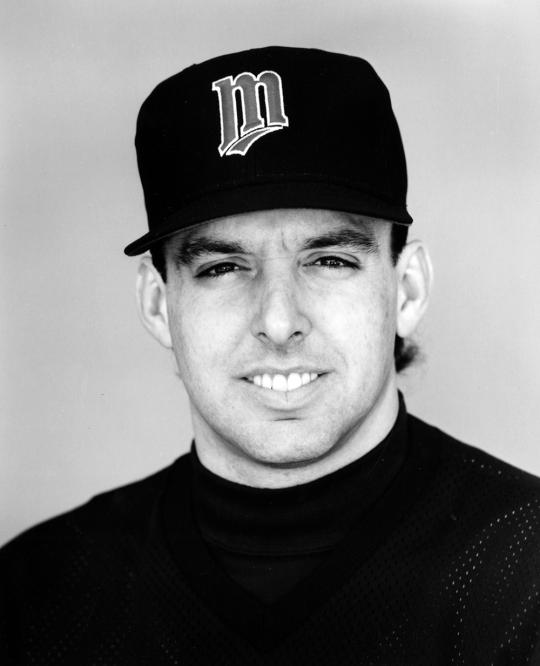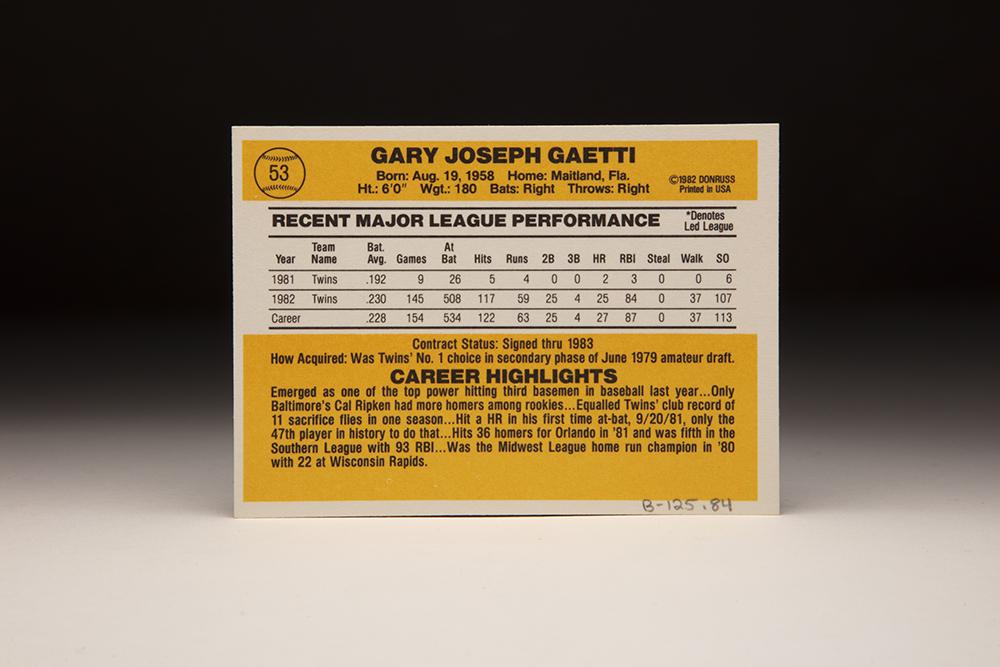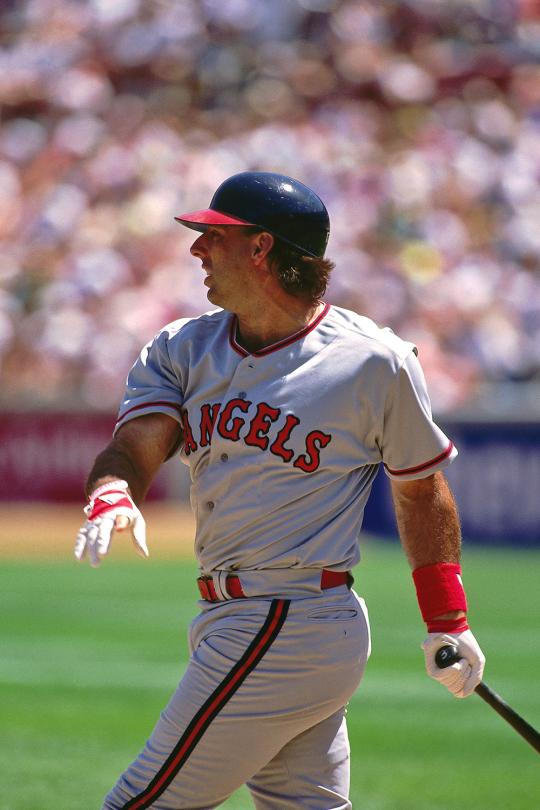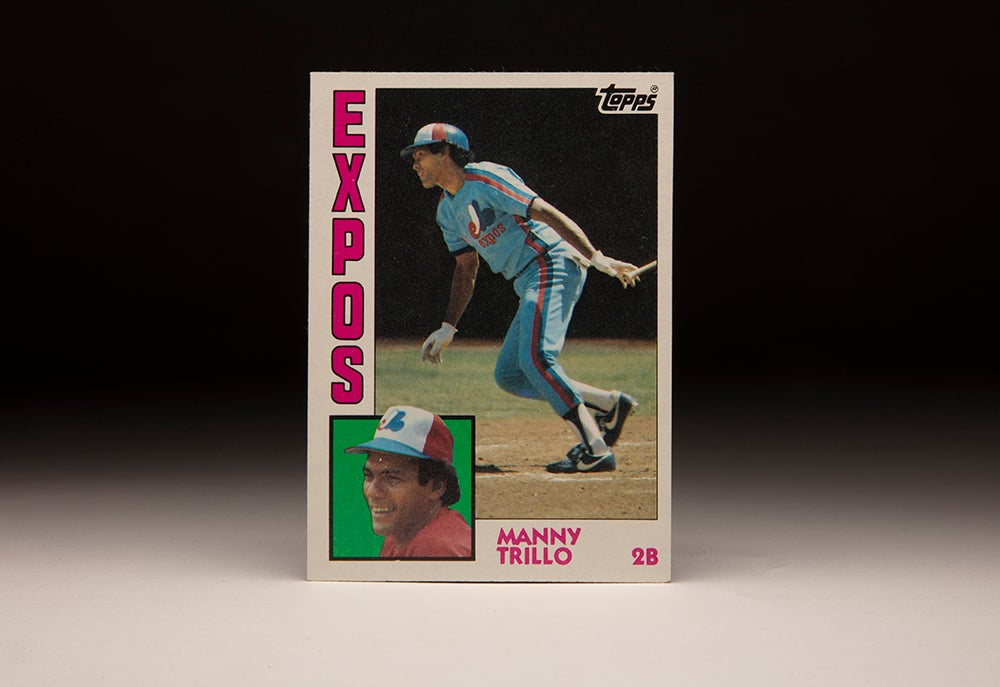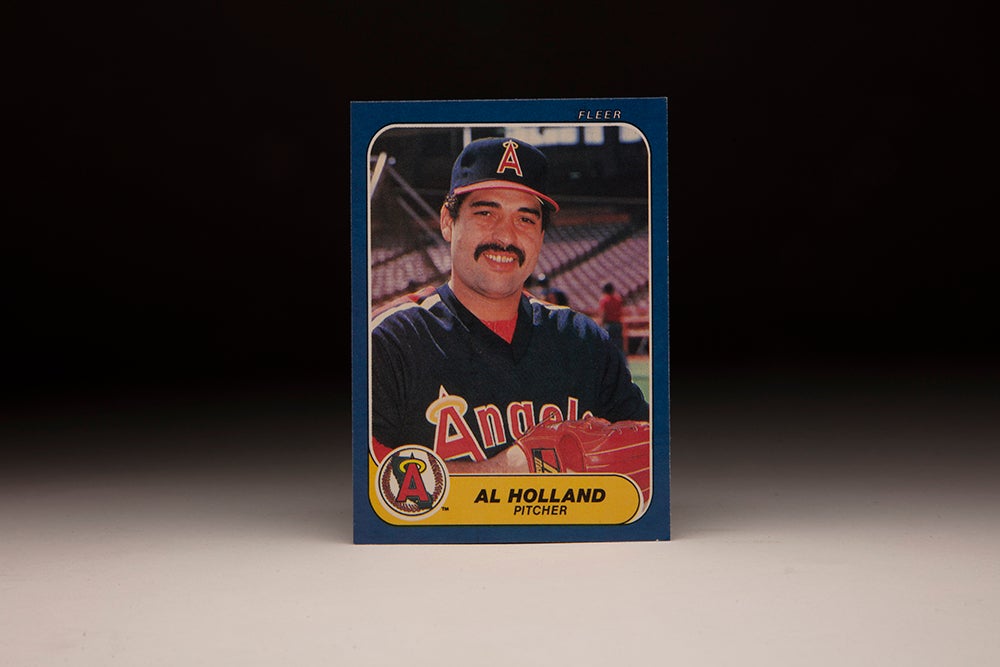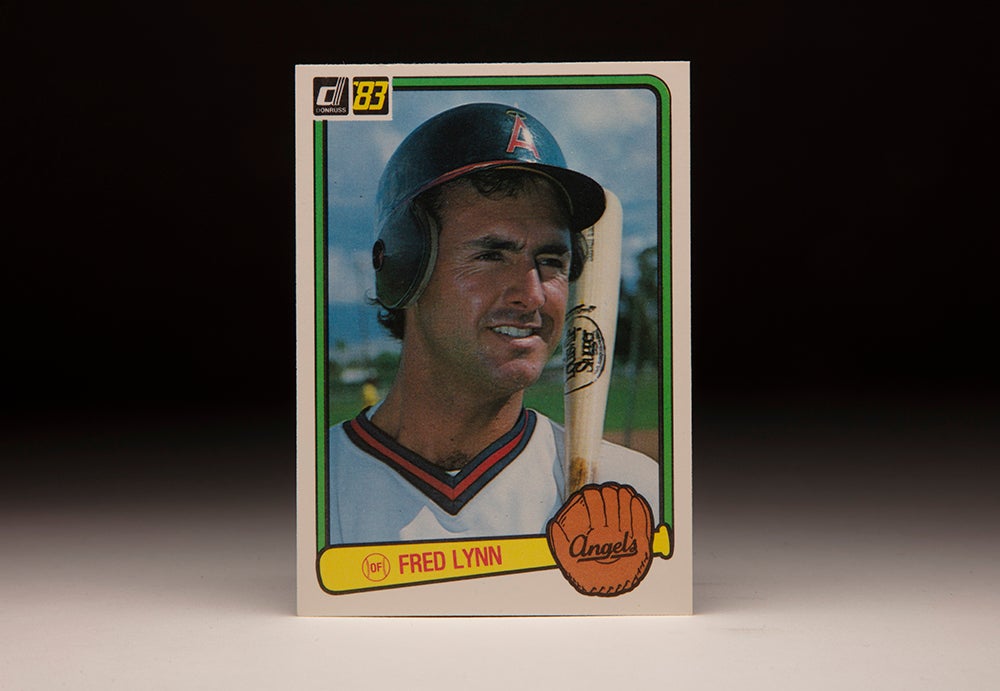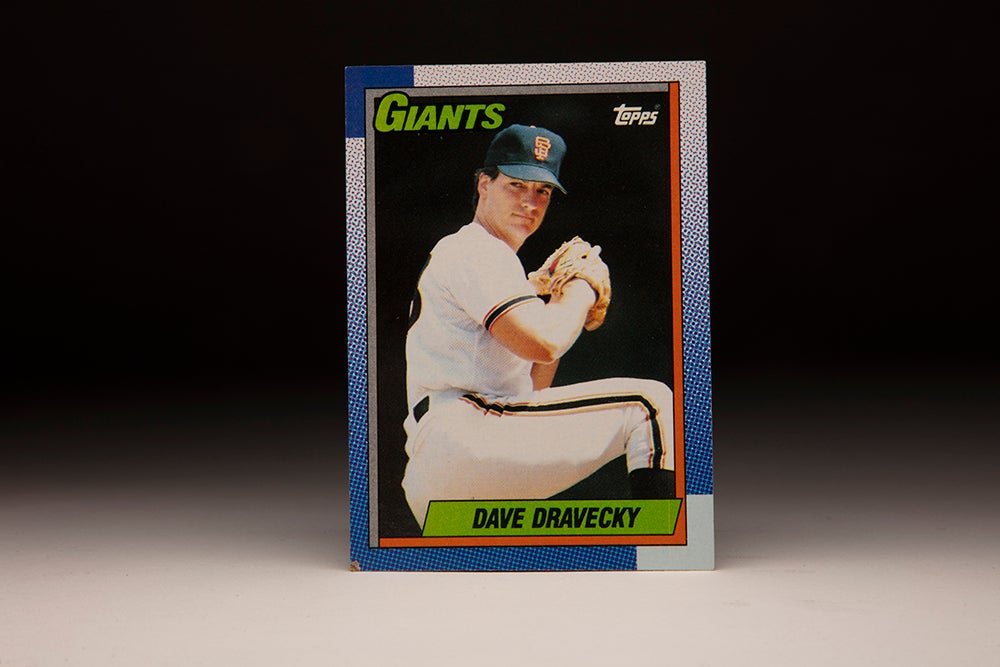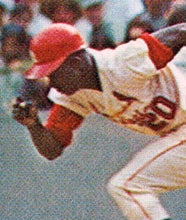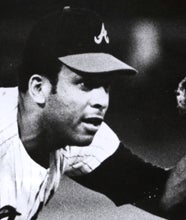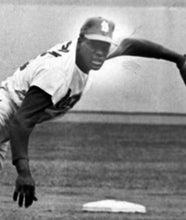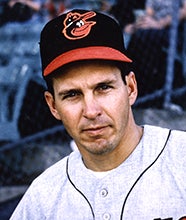- Home
- Our Stories
- #CardCorner: 1983 Donruss Gary Gaetti
#CardCorner: 1983 Donruss Gary Gaetti
More than 130 batters have homered in their first big league plate appearance, with about 40 percent of those coming since 2000.
Some, like Wilkin Ramírez and Dave Machemer, never homered again at the major league level. Then there’s Gary Gaetti, whose 360 homers are the most of any player who went deep in his first time in a big league batter’s box.
For Gaetti, that homer on Sept. 20, 1981, marked the start of a 20-year career that saw him become one of the game’s most decorated third basemen – and one of the most durable.
Born Aug. 19, 1958, in Centralia, Ill., Gaetti grew up in a working class home and developed into an all-around athlete. His father, Bill, built boxcars for the Illinois Central railroad.
Gary starred in American Legion ball and later at quarterback for Centralia High School, located about an hour east of St. Louis.
Official Hall of Fame Merchandise
Hall of Fame Members receive 10% off and FREE standard shipping on all Hall of Fame online store purchases.
“The Cardinals were all my heroes growing up,” Gaetti told the St. Louis Post-Dispatch.
Gaetti was undrafted out of high school and enrolled at Northwest Missouri State University. He hit .245 with four homers and 24 RBI as a freshman shortstop but ran in to grade difficulties and transferred to Lake Land College in Mattoon, Ill., about 90 minutes from Centralia.
At Lake Land, Gaetti he led the team to the state junior college title in 1978. He spent one season there and was selected by the Cardinals in the January 1978 MLB Draft but rejected their $500 bonus offer and transferred back to Northwest Missouri State, where he hit .342 as a junior before being selected by the Twins in the first round of the secondary (college) phase of 1979 MLB Draft with the 11th overall pick.
Gaetti credited Lake Land head baseball coach Gene Creek with putting him on a path to the big leagues.
“Coach Creek had a winning program and it was my first taste of winning at an organized level,” Gaetti old told the Journal Gazette of Mattoon, Ill. “It was a real serious baseball atmosphere which carried over into my pro career.”
The Twins assigned Gaetti to Elizabethton of the Appalachian League, where he hit .257 with 14 homers and 42 RBI in 66 games – transitioning from shortstop to third base. In 1980, Gaetti played for Wisconsin Rapids of the Class A Midwest league, hitting 22 home runs and driving in 82 runs while stealing 24 bases.
Promoted to Double-A Orlando in 1981, Gaetti was part of a powerhouse team that hit 167 homers – including 42 by catcher Tim Laudner – and won the Southern League title under the direction of future Twins manager Tom Kelly. On Sept. 20, 1981, Gaetti debuted in the big leagues – homering off the Rangers’ Charlie Hough in the second inning at Arlington Stadium.
Gaetti became the 47th player in history to homer in his first big league at-bat.
“It’s easier to do good up here, with the playing conditions and everything,” Gaetti told the St. Joseph (Mo.) Gazette. “When you get to this level, it’s just doing your job. I think I showed that I can play.”
Gaetti won the job as the Twins’ starting third baseman in 1982 and went 4-for-4 with a triple and two home runs on Opening Day. The pitchers eventually caught up to him, but Gaetti finished the year with 25 home runs and 84 RBI in 145 games, hitting .230 while leading the American League with 13 sacrifice flys. He finished fifth in the AL with a .963 fielding percentage and fifth in the AL Rookie of the Year voting.
“I’ve learned,” Gaetti told the St. Joseph Gazette during his rookie season, “that you have to make (the pitchers) throw it over the plate.”
Gaetti hit .245 in 1983 with 21 homers and 78 RBI and also led AL third basemen in putouts (131) and double plays (46) while finishing third in assists (360). He improved his batting average to .262 in 1984 but saw his power almost completely evaporate, hitting just five home runs in 162 games.
Gaetti didn’t homer until his 31st game of the season and went from May 27 to July 29 without a home run.
“I don’t care if I hit one home run every 100 at-bats,” Gaetti told the Associated Press. “As long as we win, it’s fine with me.”
The Twins finished 81-81 in 1984 and were putting the pieces in place for a championship club. But in 1985, Minnesota slipped to a 77-85 mark, costing manager Billy Gardner his job. Gaetti, however, rediscovered his power and hit 20 home runs to go along with 63 RBI.
In 1986, the Twins regressed further with 71 wins. But Gaetti took a quantum leap forward with 34 home runs (third in the AL) and 108 RBI (fifth) while hitting .287 and winning the first of four straight Gold Glove Awards. Gaetti was also reunited with Tom Kelly, who replaced Ray Miller as manager in September.
“We just never really put it together,” Gaetti told the Tampa Bay Times of the 1986 Twins. “The manager (Miller) had some different philosophies on managing and it just didn’t jive.”
But in 1987, the Twins went from sixth place to AL West champions as Gaetti virtually duplicated his 1986 campaign with 31 homers and 109 RBI while hitting fourth or fifth in the lineup most of the year. Minnesota entered the ALCS as a heavy underdog to the Tigers, but Gaetti got things rolling immediately with home runs in his first two at-bats in the Twins’ 8-5 Game 1 victory.
Gaetti became first player to homer in each of his first two postseason at-bats.
“You see a guy like Gary step up and do that in his first playoff game, and every man on this team realizes we have a shot to win this thing,” Twins designated hitter Don Baylor told the Rocky Mountain News. “I saw that, and I was inspired by it.”
Gaetti hit safely in four of the five ALCS games and called a key pickoff in Game 4 with the Twins clinging to a one-run lead with Tigers on second and third and one out. Laudner and Gaetti teamed up to nab Darrell Evans leaning off third base, and the Twins escaped with no further damage and won the game 5-3.
Gaetti was named the series MVP.
“Gary’s a guy who’s been overlooked nationally for too long,” teammate Randy Bush told the Minneapolis Star Tribune. “This guy’s been left off the All-Star team year after year. He really deserves this.”
In the World Series against St. Louis, Gaetti hit .259 with a homer and four RBI before scooping up Willie McGee’s grounder and firing to first base for the final out of Game 7 to give the Twins the title. He became a free agent after the 1987 World Series but the Twins re-signed him to a three-year deal worth a reported $4.3 million.
“I’ve played hard, done what they asked of me and have given 100 percent each day,” Gaetti told the Journal Gazette of Mattoon, Ill., during Spring Training of 1988. “It has been everything I thought it would be and in some cases more. I never dreamed of making this kind of money.”
“Oh, I would love to break Roger Maris’ home run record, hit .410, steal 100 bases and drive in 190 runs,” Gaetti told the Journal Gazette, “but I really never set personal goals for myself. Winning is the most important thing. Everything else takes care of itself.”
Gaetti didn’t hit .410 in 1988 but did reach the .300 mark for the only time in his career, batting .301 with 28 homers and 88 RBI. He was named to his first All-Star Game and won his third straight Gold Glove Award. The Twins won 91 games – six more than they did in the 1987 regular season – but finished second in the AL West and missed the postseason.
Gaetti won his fourth-and-final Gold Glove Award in 1989, earning another All-Star Game selection while hitting .251 with 19 homers and 75 RBI. But in 1990, his batting average dipped to .229 to go along with 16 homers and 85 RBI. He did, however, enter the record books that year when he started two triple plays in the same game on July 17 against the Red Sox. No team had ever turned two triple plays in one game before that day.
With his contract expiring with the Twins, Gaetti signed a four-year deal with the Angels worth $11.4 million.
“It was probably the lowest moment we have had as far as our (public relations) standing with the fans was concerned,” Twins general manager Andy MacPhail told the Star Tribune about Gaetti’s departure. “It had to be hard for them to accept the fact that Gary was gone. It was hard for me to accept.”
But the Twins and MacPhail celebrated that fall when the team won its second World Series title in five seasons. Gaetti, meanwhile, turned in his usual solid numbers with his new team – hitting .246 with 18 homers and 66 RBI while leading all AL third basemen in assists (353) and double plays (39) for the fourth time in his career.
But he hit just .226 in 1992 and struggled mightily the following year, hitting just .188 with no homers and four RBI through May. On June 3 – with more than a year-and-a-half remaining on his contract – the Angels released Gaetti.
He latched on with the Royals two weeks later, however, and rediscovered his stroke – hitting 14 homers with 46 RBI in 82 games. Then in 1994, Gaetti hit .287 with 12 homers and 57 RBI in 90 games as Kansas City’s everyday third baseman.
The Royals signed him to a one-year deal for 1995, and Gaetti rolled back the clock – hitting 35 homers and driving in 96 runs in his age-36 season. He finished 10th in the AL MVP voting – the first time since his three-year stretch of 1986-88 where he had drawn MVP votes – and also won a Silver Slugger Award.
On Dec. 18, 1995, Gaetti returned to his roots by signing a one-year, $2 million contract with the Cardinals – the team he rooted for as a child.
“I can’t tell you how many times I stood in the front yard, back yard, everybody’s yard – pretending to be Bob Gibson, Tim McCarver, Mike Shannon, (Julian) Javier, (Orlando) Cepeda, (Lou) Brock,” Gaetti told the St. Louis Post-Dispatch after signing with the Cardinals.
Gaetti’s veteran presence – along with his 23 homers and 80 RBI – helped the Cardinals win the NL Central title in 1996. Back in the postseason for the first time since 1987, Gaetti hit a three-run homer in the first inning of Game 1 of the NLDS vs. the Padres, giving the Cardinals the only runs they would need in a 3-1 win. St. Louis swept the series to advance to the NLCS, where Gaetti hit a grand slam off Greg Maddux in Game 2 to turn a 4-3 Cardinals lead into an 8-3 advantage.
Gaetti added two hits apiece in Game 3 and Game 5 but the Cardinals lost the series to the Braves in seven games. Gaetti returned to the Cardinals on a one-year deal for the 1997 season and hit .251 with 17 homers and 69 RBI while leading the NL in fielding percentage among third basemen with a .978 mark. He repeated that title a year later but was not with St. Louis at the end of the season as the Cardinals released him on Aug. 14 in the wake of a trade for third baseman Fernando Tatis. Gaetti, however, signed with the Cubs five days later and helped Chicago win the NL Wild Card by hitting .320 with eight homers in 37 games.
He returned to the Cubs in 1999 but hit just .204 in 113 games. After a short stint with the Red Sox to begin the 2000 season, Gaetti retired on April 14.
“I was concerned because my knee didn’t feel good,” Gaetti told the Associated Press, referencing offseason surgery on his left knee. “There’s the feeling of being dead weight, the money for nothing part of things. That affects how you feel about yourself.”
Gaetti went on to become the hitting coach of the Astros from 2004-06 and later managed the Sugar Land Skeeters. He finished with 2,282 games played at third base, behind only Brooks Robinson and Graig Nettles at the time of his retirement.
He totaled 360 home runs and 1,341 RBI over 20 big league seasons.
“I try to keep everything in perspective,” Gaetti told the Fort Worth Star-Telegram during the 1987 World Series. “Once I take the field, I know everything is going to be all right. I know because that’s what I know best: Playing baseball.”
Craig Muder is the director of communications for the National Baseball Hall of Fame and Museum

